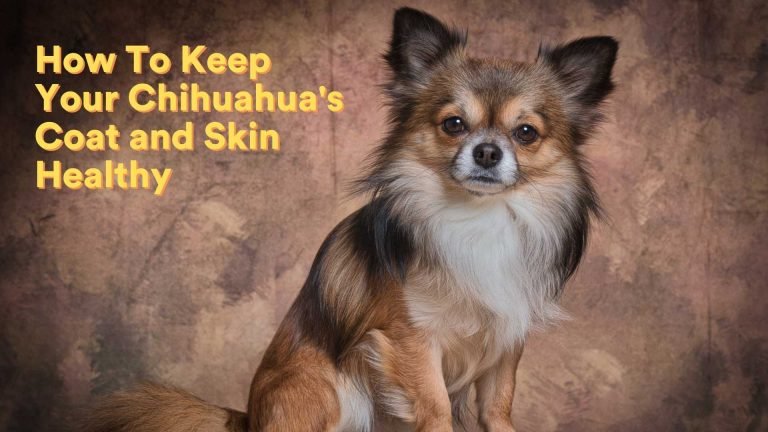Why Do Chihuahuas Shake or Tremble? – What You Need To Know!
Chihuahuas are known for being small, adorable, and playful. They’re also well-known for their propensity to shake or tremble — especially when they’re scared or cold. So why do Chihuahuas shake so often?
Chihuahuas shake due to a number of causes. It could result from high metabolism, low blood sugar, being cold, or being nervous. Some other causes of shaking include kidney disease, generalized tremor syndrome (GTS), and allergies.
In this blog post, we’re going to learn more about Chihuahuas shaking. We’ll look at the causes of trembling, how to help your Chihuahua if he’s shaking due to fear or anxiety, and how a low blood glucose level is related to trembling.
Learn more about your beloved pet by reading this blog post!

Reason #1: High Metabolism
One of the reasons why Chihuahuas shake or tremble so often is because they have a high metabolism.
As we already know, Chihuahuas are small dogs. They’re tiny. That means that their bodies burn up energy at a faster rate than other breeds — and this includes heat production.
Subsequently, Chihuahuas tend to lose heat rapidly, which makes them sensitive to cold.
What To Do:
For this reason, Chihuahuas should never be kept outside as house dogs or in an unheated building.
Make sure to keep your Chihuahua indoors and in warm places. When you’re out during the winter, make sure that he wears a sweater or coat.
Reason #2: Low Blood Sugar
Another reason why Chihuahuas shake or tremble is that they may have low blood sugar (hypoglycemia).
It’s important to know that Chihuahuas and other toy breeds are more likely to experience hypoglycemic shock than larger dogs.
What To Do:
For this reason, many health experts recommend giving your dog food every 2-3 hours, even if they don’t appear to be hungry.
If you have a Chihuahua who regularly trembles or shakes, make sure to check his blood sugar level. This can be done by taking him to the veterinarian for testing.
Reason #3: Cold Temperatures
Another reason why Chihuahuas shake is because they’re cold.
Chihuahuas are very small dogs. As a result, their body mass can respond to temperature changes much more quickly than larger breeds — which means that they become cold faster.
They’re not well-adapted to cold weather. While Chihuahuas are originally from Mexico and other warm regions of the world, they’re now commonly kept as house dogs.
What To Do:
To keep your Chihuahua warm and comfortable in cold weather, make sure to dress him up. A sweater or coat will help to reduce his risk of hypothermia and help you avoid the difficult task of drying a wet dog after walks in winter snow.
Reason #4: Nervousness or Fear
Chihuahuas shake and tremble very often because they’re nervous or afraid.
For example, Chihuahuas are sometimes frightened by strange people or animals. In these situations, a Chihuahua may tremble in fear without being able to escape.
On the other hand, Chihuahuas may be nervous about going outside or being left alone. This type of trembling is known as separation anxiety.
What To Do:
For this reason, it’s important to socialize your Chihuahua and help him grow comfortable with new people or unusual circumstances.
By doing so, you can reduce the chances that he’ll be afraid in everyday situations.
Additionally, make sure not to punish your Chihuahua when he shakes or trembles. You don’t want him to associate trembling with his punishment.
Reason #5: Kidney Disease
Another reason why Chihuahuas shake or tremble is that they may have kidney disease.
When kidneys fail, wastes build up in the body, and blood pressure may rise. In severe cases, these effects can cause a dog to shake or tremble as if he has a seizure.
What To Do:
If your Chihuahua shakes when he’s lying down, you should immediately see a vet because this may be a sign of kidney failure.
If you notice that your Chihuahua trembles when he’s standing or walking, this may be a sign of high blood pressure. Reduce his stress and try to keep him calm.
Reason #6: Generalized Tremor Syndrome
GTS is caused by degeneration in the nervous system. As the disease progresses, it causes a dog to shake both at rest and while performing voluntary movements.
While GTS is quite rare in dogs, Chihuahuas are the breed most commonly affected by the condition. It’s more prevalent among small breeds like miniature poodles, Pomeranians, Yorkshire terriers, Maltese, and Shih Tzus.
Chihuahuas with GTS usually first show symptoms at around age five or six. The tremors get worse as time goes on, but they tend to stabilize after about a year and a half.
What To Do:
Unfortunately, there’s no cure for GTS. Your best bet is to keep your Chihuahua as healthy and comfortable as possible by providing a stress-free environment, plenty of exercises, quality food, and routine veterinary care.
In most cases, a veterinarian will prescribe anti-seizure medications to manage symptoms.
However, as with many other medical conditions that cause trembling or shaking in dogs, it’s important to avoid showing your Chihuahua any kind of negative reaction when he tremors.
Reason #7: Allergies
Another reason why Chihuahuas shake is because they’re allergic to something in their environment.
Chihuahuas are allergic to many different things, including dust, pollen, insect bites, and certain medications. These allergies cause a lot of discomfort for the Chihuahua.
What To Do:
For this reason, you should limit your dog’s exposure to allergens as much as possible. If your Chihuahua is shaking or shivering a lot, try giving him an antihistamine in the morning and at night.
Conclusion
Chihuahuas shake or tremble for all sorts of reasons. They may be shaking in fear, from a neurological disorder, or because they’re allergic to something in their environment.
However, regardless of the reason, it’s important not to show your Chihuahua any kind of negative reaction when he trembles.
By doing so, you can avoid making his fear or anxiety worse.
If you are concerned about your Chihuahua’s shaking, it is always best to take him to a veterinarian to be examined and tested.
Veterinary care for this breed should be a priority as they are prone to various health issues that may cause them discomfort throughout their lifetime.




![Is My Chihuahua Too Skinny? [What You Need To Know!]](https://atractivopets.com/wp-content/uploads/2021/10/1-11-768x432.jpg)


